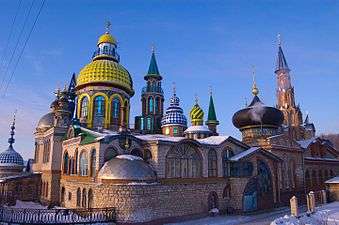Kazan ethnic communities
This is an article about ethnic groups in the city of Kazan, Russia.
Tatars and Russians
The city's population is mainly composed of Russians (about 48.6 percent) and Tatars (about 47.6 percent).
Other communities
Native Middle-Volgans

The city's third ethnos is Chuvash (1.2%), who speak their own language. Chuvash is a Turkic language, which makes it a sister language to Tatar, but it is the most distinct among all the Turkic languages. The Chuvash are Russian Orthodox with some pre-Christian elements in their religion. Other nations native to the Middle Volga are the Maris (0.3%), Udmurts (0.1%), Mordvas (0.2%) and Bashkirs (0.2%). Some of them speak Tatar, some Russian and others their own languages. Bashkirs are normally Muslims. Others, like the Chuvash, are traditionally Orthodox Christian with some pre-Christian elements in their religion.
Some Mari come to Kazan for seasonal work, mostly woodwork and carpentry. They build summer houses and saunas for local people. Chuvash and Mari come to the city every day from their republics and sell potatoes and mushrooms at bazaars.
Ethnic Germans
Ethnic Germans came to Kazan from the 18th century. They served in the Russian Army, or worked in Kazan State University. Some of them are very famous in Kazan, particularly professor Karl Fuchs. During World War II, most of them were repressed and deported/ethnic-cleansed by Joseph Stalin's government.
Today, the remaining Germans of Kazan mostly speak Russian.
Other groups
Assurs (Assyrians)
A community of Assurs also live in Kazan. By tradition, they work at shoe repairing. Their community lives a closely guarded life, and they do not traditionally mix with other communities.
Immigrants in the Soviet period
During World War II a lot of the populations of what would become, after annexation during the war, the Western Soviet Union were deported to Kazan, including schools, educational institutes, and plants. Some of that population did not return to their native lands. They are: Jews, Ukrainians, Belarusians, Poles, and others (nearly 2.5% of population). They speak Russian, sometimes with Ukrainian accent, and many Jews also speak Tatar.
Immigrants in the 1990s
One of the biggest minorities of Kazan is the Azeri community. Most of them are undocumented. Azeri tradesmen control all the bazaars. They often sell imitation clothes of famous trademarks or fruits.
Other Caucasians come from Dagestan, Georgia, Armenia and others. They often own cafés or work in construction.
Another big community is the Central Asian community, which includes Uzbeks, Tajiks, Roma (Lyuli branch) and Kyrgyz. Some of the Uzbeks and Tajiks own cafés or fast-food restaurants; they sell dried apricots, popular among Kazan citizens.